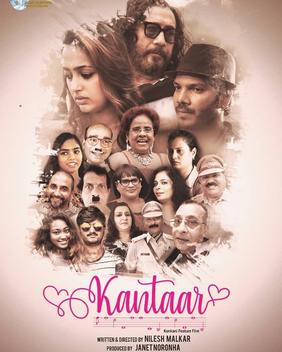Synopsis
The film is about a mine-owner family and its interaction with the residents of the mining belt of Goa.
The bountiful nature and the pristine beauty of Goa is a joy for Goans and nature lovers all over the globe. Known all over the world as a popular tourist destination, Goa remains a dream holiday destination for everybody. But little known is the fact that the mining industry is an important part of Goa's economy. It could be the story of any of the mining families in Goa, with a young scion taking learning the ropes the newest member of the family, a pretty, educated daughter-in-law, Aleesha.
Aleesha is an artist photographer who is an ardent lover of nature. Married in the family of industrialists, she finds herself in a conflict of interests. Her struggle to set right the blatant violation and flouting of rules brings her in direct confrontation with her family's business interests. Moreover, her hard stance of exposing the facts does not go down well with the involved parties. In the film, Aleesha depicts her persuasiveness and the manner in which she manages to prevail over her husband and in-laws who themselves are mine owners. Aleesha's message is that of co-existence of an eco-friendly industry with nature being the need of the hour.
Priyanka Bidye plays the lead role well, a bit dramatised for the effect. It is Prashanti Talpankar, lecturer in Dnyanaprasarak Mandal's College on the outskirts of Mhapsa and a writer in her own rights, who grabs the attention in her role as "Philo", the wife of a deceased truck driver in the mining belt. The film ably depicts the neglect of the environment by industrialists, changing trend in mining, with afforestation and social concern increasing in the mining companies. The role in real life that is played by qualified and professional Environmental Managers working under an ISO 14001 regime is shown in reel life as led by the daughter-in-law. Prince Jacob and Lorna have also made guest appearances, where Lorna sings Portun Aikat Mozo Tavo and Prince Jacob as a government officer / inspector.

Karwar is a seaside city, taluka, and administrative headquarters of Uttara Kannada district lying at the mouth of the Kali river on the Kanara coast of Karnataka state, India.

Lorna Cordeiro, also known as Lorna, is a Konkani singer from the coastal state of Goa, India, and is popularly known as the "Nightingale of Goa".
"Channeache Rati" is a Goan Konkani song.

Paltadacho Munis or The Man Beyond the Bridge is an Indian film in Konkani directed by Laxmikant Shetgaonkar. Set in Goa, the film is about a recently widowed forest ranger in a dwindling forest, who strikes up an unlikely relationship with a woman he finds lost and alone in the woods. The film tries to destigmatise mental illness, often equated with being possessed by the devil in rural India.

O Maria is a Konkani language film released in 2010 in Goa, India. It is the fourth film by Rajendra Talak after the National Award winning Aleesha in 2004, Antarnad in 2006 and Sawariya.com in 2008.

Konkani cinema is an Indian film industry, where films are made in the Konkani language, which is spoken mainly in the Indian states of Goa, Maharashtra and Karnataka and to a smaller extent in Kerala. The films have been produced in Goa, Karnataka, Maharashtra and Kerala.

Damodar Mauzo is a Goan short story writer, novelist, critic and script writer in Konkani. He was awarded the 57th Jnanpith Award, India's highest literary honour, in 2021, Sahitya Akademi Award in 1983 for his novel Karmelin and the Vimala V. Pai Vishwa Konkani Sahitya Puraskar award for his novel Tsunami Simon in 2011. His collection of Short stories Teresa's Man and Other Stories from Goa was nominated for the Frank O'Connor International award in 2015. He has served as a member of the executive board, general council, as well as the finance committee of the Sahitya Akademi.

Goa is a state on the southwestern coast of India within the Konkan region, geographically separated from the Deccan highlands by the Western Ghats. It is located between the Indian states of Maharashtra to the north and Karnataka to the east and south, with the Arabian Sea forming its western coast. It is India's smallest state by area and its fourth-smallest by population. Goa has the highest GDP per capita among all Indian states, two and a half times as high as the GDP per capita of the country as a whole. The Eleventh Finance Commission of India named Goa the best-placed state because of its infrastructure, and India's National Commission on Population rated it as having the best quality of life in India. It is the third-highest ranking among Indian states in the human development index.

Baga Beach is 2013 Indian Konkani-language film written and directed by Laxmikant Shetgaonkar. It followed his critically acclaimed Paltadacho Munis (2009).

Nachom-ia Kumpasar, is a Konkani musical drama film. It is based on the lives of two jazz musicians, Chris Perry and Lorna. The film, which takes its title from the name of a song by the two artists, was directed by Bardroy Barretto. It starred Vijay Maurya and Palomi Ghosh in the lead roles. The story is told through over 20 popular Konkani songs from the 1960s and 1970s that have been re-recorded for this film. The film is set in the 1960s and is a tribute to the 'unsung' Konkani musicians of that era.

Enemy? is a 2015 Indian mystery film produced by A. Durga Prasad and directed by Dinesh P. Bhonsle who has previously directed Hindi-movie Calapor. The music was composed by Schubert Cotta. The film won the Best Konkani film Award in 63rd National Film Awards, Vigyan Bhawan New Delhi. It was officially selected to be screen at the 21st Kolkata International Film Festival 2015, Goa Marathi Film Festival 2016 and London Indian Film Festival 2016. Enemy was selected for the Indiwood Panorama Competition section at the 2nd edition of Indiwood Carnival 2016 in Hyderabad.

Ramesh Veluskar was a Konkani poet and litterateur from Goa. He died on October 21, 2018.
Prashanti Talpankar is a writer, translator, playwright and actor, hailing from the coastal state of Goa, India. She is also a recipient of the Sahitya Akademi Award for Translation. She currently serves as an associate professor at Dnyanprassark Mandal's college and Research Centre, Assagao.

Juze or Juje is a 2017 Indian film in Konkani, written and directed by Miransha Naik. The film is about the social injustice and exploitation faced by migrant labourers in Goa, and is set in the 1990s. It was co-produced by people from India, France and Netherlands under the banner of Goa Film Bazaar, with some of the editing done in Paris.

Rajendra Talak is an Indian film director, from Goa. He is best known for his award-winning Konkani films, Aleesha and O Maria.

Paresh Narendra Kamat is a Konkani poet from Marcaim, Goa, India.

Kantaar (transl. Song) is a 2019 Indian Konkani-language film written and directed by Nilesh Malkar and produced by Janet Noronha. It stars Jackie Shroff, Noel Sean and Ester Noronha. The film is about life in Goa, and finding purpose in life. After the award-winning Soul Curry, it is Malkar and Jackie's second Konkani film. The musical film features Lorna singing some jazz songs. It premiered at Ravindra Bhavan, Margao, on 28 January 2019.

Amori is a 2019 Konkani drama film based on water conservation and a nexus between politicians and builders. The film is directed by Dinesh P. Bhonsle, written by R M Vardhan, and produced by Opus Gala. Schubert Cotta has composed the music. It stars Salil Naik, Sobita Kudtarkar, Mayur Mayekar, Prashanti Talpankar, Tanmay Kharpe, and Shaina Mirashi. In 2019, the film bagged the Best Konkani Film award in the feature film category, at 66th National Film Awards.
















